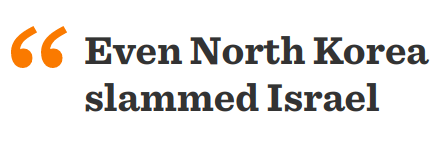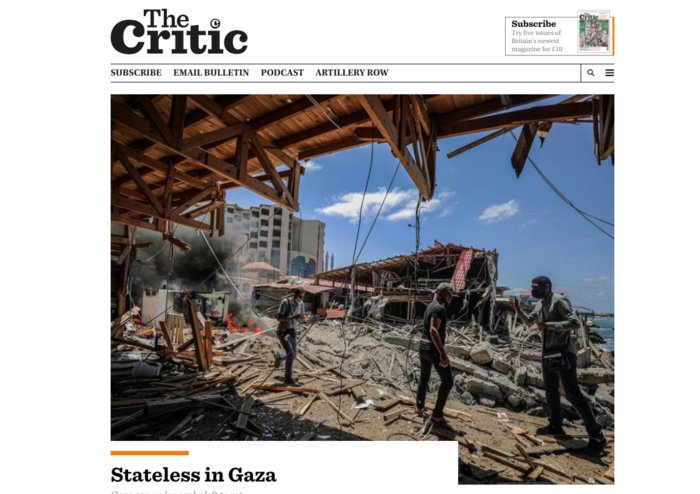The Critic is a British monthly magazine devoted to politics, ideas, art and literature. It’s dedicated to pushing back against cancel culture and the increasingly illiberal zeitgeist – the “self-regarding and dangerous consensus” in the media “that finds critical voices …triggering”. In its inaugural op-ed, they promised to take aim at those “righteously convinced of the self-evident truth of their worldview”, against those who believe that “to disagree with it is not just to be wrong” but “to be morally deficient”.
Ossified ideas and dogmas about the world that abound in institutions such as the BBC, they opined, should be aggressively challenged. Their aim is to push back against a world “deeply imbued with bad ideas” and engage in honest and intellectually rigorous analyses which distinguish truth from cliches and platitudes.
Sadly, though, an article published in their November issue, “Stateless in Gaza”, by Janine di Giovanni, is indistinguishable from the pro-Palestinian dogma we’re used to seeing at the Guardian.
The piece opens with a falsehood:
Many years ago — shortly after Yasser Arafat and Yitzhak Rabin’s infamous White House handshake, overseen by a beaming Bill Clinton — I stood on the shore of what might have been a spectacular beach in Gaza.
Spectacular because it faced the roaring Mediterranean, but the beach was covered in trash and reeked of open sewage. Electrical supply was random. The fishermen who could have profited from the resources of the sea were hampered by the rules of Israel’s occupation and embargoes that remain in place today.
Nowhere in the nearly 2,000 word article does Giovanni even allude to the fact that Israel withdrew all of its citizens and soldiers from Gaza in 2005. Nor does she cite the security reasons necessitating restrictions against the terrorist run coastal territory.
Next, we’re treated to this source-free allegation:
I looked out to the sea with a Palestinian friend, Ahmed. He had been imprisoned and tortured in an Israeli prison for his activism.
What’s Ahmed’s full name? Was he imprisoned for Hamas ‘activism’. What evidence does she has to corroborate that he was tortured? We’ll never know because Ms. Giovanni doesn’t seem to believe that such important details are as relevant as telling the moral tale she wants to tell – a story replete with sentences like the following one, adopting the agency-erasing narrative of Palestinians as mere victims
Being Palestinian meant [Ahmed] understood bitter compromises and a life of crushed promises more than anyone.
Giovanni’s portrayal of Palestinians, as a people always acted upon, and never actors, is seen throughout the piece, such as in the following:
So much has happened since then. I lost touch with Ahmed, despite returning to Israel/Palestine dozens of times: after the assassination of Rabin by a fanatical right-wing Jewish student in 1995; during the period when Gaza was home to the PLO and Yasser Arafat; after the second intifada kicked off; for Arafat’s death; during the election of Hamas; during more wars, more misery. One day I realised that I was speaking to grown men and women who were the children of those I had interviewed when I started my career…Now they were grown, but there was still no peace. If anything, the plight of the Palestinians was even worse.
Note that a “fanatical right-wing Jewish student” murdered Rabin, but the bloody Intifada was something that was simply “kicked off”. Hamas was elected. But by whom? The fact that Palestinian leaders, and many ordinary Palestinians, started and continued the four-year long terror campaign against innocent Israeli civilians, that Palestinians in Gaza made the decision to elect a proscribed terror group, and that this Islamist movement started “more wars” against Israel may have been a major reason why their plight got “even worse”.
Then, adopting the language of the radical academic left, Giovanni floats the idea that the Israeli peace offer to Palestinians in 2000, rejected by Yasser Arafat, was not a missed opportunity for Palestinians, but merely evidence of Israeli “hegemony”.
For some, the two-state solution proposed by Oslo which saw an independent Palestine alongside the State of Israel, seemed a viable solution. Others saw it as hegemonic — as were the 2000 Camp David Accords.
Then, Giovanni makes the following leap:
But after May’s brutal Israeli-Hamas fighting, with Israel’s threats to demolish more homes, with hundreds dead, mainly Palestinians — including 67 children — and with Israel’s attacks on journalists, it is clear that a two-state solution will never happen.
Leaving aside the fact that her claim regarding Israeli “attacks on journalists” likely refers to the IDF’s attack on a Gaza media building reportedly used by Hamas, and in which nobody was killed or injured, Giovanni again obfuscates Palestinians responsibility – ignoring that it was Hamas’s decision to fire rockets at Jerusalem which ignited the war.
She then engages in another deception:
Then there were this year’s elections. Naftali Bennett, who is even further to the right than Benjamin Netanyahu, rejects any peace talks. He has said he vehemently opposes a Palestinian state in the West Bank and Gaza and wants to annex much of the West Bank.
Bennett has been extremely clear that, as prime minister, there will be no annexation of West Bank land.
Then, pivoting to her core thesis, that the only solution to the conflict is one (non-Zionist) state, Giovanni writes:
For Palestinians, two states would mean the status quo that Israel has grown comfortable with: the land grabbing, the humiliation, the subjugation that has become standard practice since 1948, which the Palestinians call the nakbah, or catastrophe, and the Israelis call independence
What does this even mean? How would two states, in which Palestinians would enjoy total sovereignty, represent the status quo? Isn’t that the exact opposite of the status quo? These are questions her editors should have asked, but clearly didn’t.
Giovanni continues by arguing that not only have unnamed “international voices” called for “equal rights” for Palestinians in the West Bank and Gaza, which is how those opposing Israel’s existence often advocate for their cause, but that “liberal Israelis” are calling for this ‘solution’ as well. Again, no source is cited, so we’ll never know where she found a sizable number of Israeli Jews who seek their own state’s dissolution.
Whilst Giovanni doesn’t cite any Israeli Jews who are open to being ruled by a (likely Hamas-run) Palestinian majority, she does find one “international voice” in Dr Tareq Baconi from the Crisis Group, granting him 160 words in support of a future free of the world’s only majority Jewish state. She also quotes former HRW Middle East director Sarah Leah Whitson (who was widely condemned in 2019 for peddling an antisemitic conspiracy theory) accusing Israel of committing “ethnic cleansing” – an abjectly absurd and ahistorical charge that represents the opposite of the truth, yet is unchallenged by Giovanni.

Then, after she uncritically cites recent reports by the NGOs B’tselem and Human Rights Watch characterising Israel as an “apartheid” state, without mentioning detailed criticism of both reports, Giovanni turns up the demonising rhetoric by (in her own voice) criticising a two-state solution as something that would uphold the “status quo of a state that imposes Jewish ethno-national supremacy“.
“Jewish supremacy” is an antisemitic term historically used by Nazi Germany, and neo-Nazis. The fact that it’s recently been resurrected by the anti-Zionist left, after being used one of the NGOs she cited, says more about the precipitous moral decline of the progressive movement than it does about the current state of Jewish nationalism.
Giovanni then imagines a post-Zionist future:
But how would this kind of peace [sic] look, realistically? What if Gazans were allowed to fully develop their tremendous potential? Gaza has a 98 per cent literacy rate, a population of energetic and highly motivated young people who could become successful entrepreneurs if only Israel’s crippling embargo was lifted.
The idea that what’s really standing in the way of Gaza reaching its potential isn’t the authoritarian, antisemitic extremist movement controlling the territory, but, rather, Israeli measures preventing Hamas’s import of deadly weapons, evokes the Orwell quote that “some ideas are so stupid that only intellectuals can believe them”.
The inanity continues:
Meanwhile, Israeli citizens are accustomed to being occupiers. Liberals have been shunted aside; polls in Israel show most citizens have lost interest in any kind of peace process. They see the current situation as tolerable. This is not the second intifada where suicide bombers are killing Israeli citizens. Today the destructive power of the Israeli forces have succeeded in pushing the burden overwhelmingly on to the Gazans.
Actually, Israeli “liberals” haven’t been “shunted aside” – and, in fact, a far-left party sits in the current government. What’s occurred is that, faced with the grim reality of rejected Israeli peace offers, the savagery of the Second Intifada, and Palestinian leaders continually inculcating their people with antisemitism and terror glorification, there’s a national consensus that Palestinians leaders aren’t interested in peace. Nonetheless, the principle of two-states still garners the support of a plurality of Israelis.
Giovanni then laments that “Conflict deaths, once three-to-one Palestinian-to-Israeli, are now closer to 20-to-one”, indicating, it seems, that, in her eyes, more Israelis must die if the nation is ever to come to its senses.
Giovanni’s magical thinking continues
As for the Palestinians, a fractured relationship between Hamas, who control Gaza (they were elected in 2006 partly out of desperation for change from the misery) and the Fatah-led Palestinian Authority in the West Bank contribute to the misery of the population even further.
Of course, Hamas was elected after Israel withdrew from Gaza. Palestinians voted for the most extreme, anti-peace party when the first opportunity for their “misery” to be alleviated presented itself.
Giovanni then offers this – which is evidently not meant to be satirical and which was deemed by editors to be pull-quote worthy:

She then writes:
But there are distinct changes. If something came from the terrible 11 days of misery that Gazans endured under Israeli bombs, it is a kind of reckoning. The Palestinians (and by that, I do not mean Hamas, as nearly every Palestinian I know does not support them) might have lost the military battle, but they won the hearts and minds campaign.
We don’t know how many Palestinians she personally knows, but, even before the recent conflict, Hamas enjoyed the support of one-third of the Gaza population, and one-quarter of Palestinians in the West Bank. And, if the conflict that Hamas initiated – despite knowing they couldn’t win, and well aware of the suffering the war would cause among Palestinians – truly, as Giovanni claims, won “the hearts and minds” of Palestinians, then that’s a dispiriting commentary on the Palestinian attraction to extremism.
Editors at The Critic need to ask themselves how a venture designed to push back against the elite echo-chamber as exemplified by media institutions like the BBC managed to go beyond even the corporation’s predictable anti-Israel bias we document on these pages, by publishing a morally obtuse and egregiously ill-informed paean to Hamas’s dark fantasy of a world without a Jewish state.
The article is the elite journalistic equivalent of the dim-witted, Corbyn-loving, vapid slogan chanting, Palestine Solidarity Movement-style, Israel obsessed activist the magazine would mock in any other context. At least on the Israeli-Palestinian issue, they’ve become the very thing they were created to fight.


